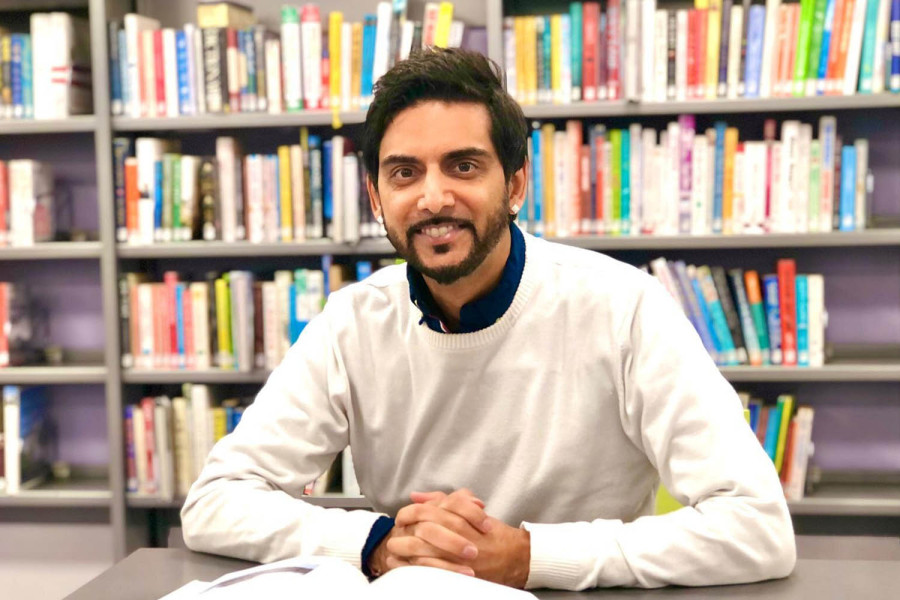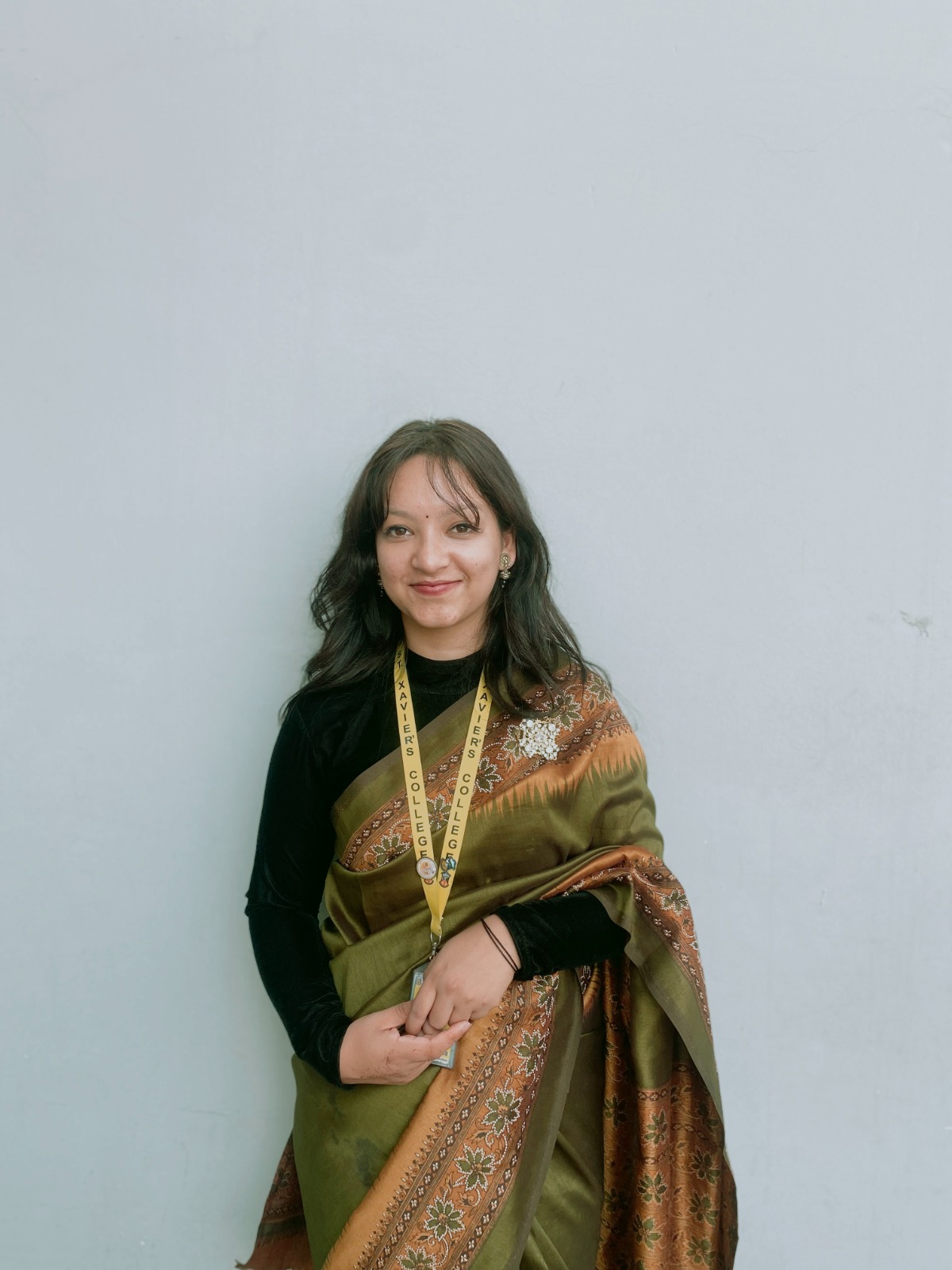Books
Teaching language with puzzles and crosswords
Rishi Handa, head of Sanskrit at St James Senior Boys School, England, discusses his teaching methods and insightful experiences in Nepal.
Aarya Chand
Rishi Handa is an educator and researcher specialising in South Asian and Punjab studies with a PhD from SOAS University of London. He currently heads the Sanskrit and Religious Studies departments at St James Senior Boys’ School, England, also teaching Mathematics and Ancient Greek.
In addition to his academic work, Handa is a musician who co-founded the band ‘Flute That Groove’ and performed with artists like Anup Jalota, an Indian singer known for his contributions to the Bhajan genre of Indian music. He is fluent in several languages, including Urdu, Hindi, Punjabi, English, and Sanskrit, combining his skills in education, music, and cultural exchange.
In this chat with the Post’s Aarya Chand, Handa discusses his career, blending education, cultural studies, and music while reflecting on his academic and creative experiences.
As the Head of Sanskrit at a British school, how do you approach teaching this ancient language to students who might not have a cultural or historical connection to it?
I use an unconventional approach, focusing on neuroscience and psychology, to make Sanskrit learning enjoyable. I introduce letters through puzzles and crosswords. To make vocabulary engaging, I incorporate hip-hop beats. I teach grammar tables vertically to help students see patterns, making it easy for them to understand the logic rather than just memorising it.
The challenges include helping neurodiverse students who may struggle with memorisation or pronunciation. I guide them step-by-step through sound mechanics for pronunciation.
Teaching Sanskrit alongside Latin and Ancient Greek, highlighting their structural similarities, creates opportunities for cognitive development. It trains the brain to think in a systematic and logical process.
You have a rich academic background spanning both philosophy and mathematics. How do you think these two fields complement each other?
Philosophy and mathematics complement each other in promoting critical thinking by focusing on logic and reasoning. Philosophy encourages students to explore the ‘why’, question assumptions, and analyse arguments, while mathematics emphasises the ‘how’ through structured problem-solving.
As a teacher of both, I use my background in mathematics to clarify reasoning in philosophy and connect abstract mathematical concepts to more general guidelines.
Together, these fields develop creative and logical thinking, giving students a strong foundation for critical thinking and intellectual growth.
Your band, ‘Flute That Groove’, blends Indian classical instruments with contemporary sounds. How do you see music contributing to cultural preservation and bridging cultural divides, particularly in a globalised world?
Music contributes to cultural preservation and bridges cultural divides. People interested in world music may be drawn to a particular genre, like Western folk fans who appreciate Indian classical music. While Indian classical music has a bit of an acquired taste and is not for everyone, fusion music, like what we do, blends Indian and Western instruments. This allows us to play Indian songs in a Western-style or put an Indian twist on English songs.
Music unites people by blending different cultural elements, creating something that resonates with a broader range of listeners.
How do you view the role of multilingualism in enhancing cultural understanding and academic research?
Understanding each other’s languages is the gateway to understanding a culture. Language defines a culture, and without it, the culture is lost. Every language has a unique way of expressing ideas, and there is no perfect one-to-one translation between them.
For example, in English, we prefer the active voice, such as ‘the man eats the apple,’ but Sanskrit typically favours the passive, like ‘the apple is eaten by the man.’
This reflects a different way of thinking. In Sanskrit, the focus is more on the object than the subject. This aligns with philosophies like Vedanta, where one sees oneself as the instrument rather than the doer.
Moreover, certain words don't have direct translations. Words like ‘Vishwas’, ‘Nishtha’, and ‘Shraddha’ are often translated as ‘faith’, but each carries its unique connotation in the Indian context. Understanding such nuances is essential.
One’s understanding is limited and filtered without knowing a culture's language. I’ve seen how knowing the original language, like Greek for the Bible, can change everything. During a debate, I remember someone using Greek insights to shift the whole perspective, showing how language deepens cultural understanding.
What was your most memorable experience in Nepal? Did you find similarities between the cultural or religious practices and your studies of South Asian traditions?
My experience in Nepal has been insightful. One of my most memorable moments was discovering the connection between the practices here and my research on the Udasi tradition, which is rooted in Guru Nanak’s teachings.
Before arriving in Nepal, I felt unsure because I had no prior knowledge or frame of reference for the country. Unlike India, which was somewhat familiar to me, Nepal was entirely unfamiliar. However, people assured me of the country’s warm and friendly nature, and their words turned out to be true. The culture here feels grounded, and the people are calm, which I find refreshing.
I’ve also been struck by the lack of anger or aggression. Even when navigating through crowds, there’s a sense of calmness. Something special happened when I visited a local area in Kathmandu and stumbled upon a Udasi Ashram, which was a perfect, unexpected connection to my academic research.
The discovery felt like a stroke of serendipity. As I wandered down an unassuming alley, I heard verses from the Guru Granth Sahib streaming through a window. I hadn't expected to encounter such a place during my visit to Nepal, which made it all the more meaningful given my studies of South Asian and Punjabi traditions.
With a diverse professional background that includes teaching, music, and filmmaking, what inspires you to keep exploring new avenues? Are there any upcoming projects or ideas you are particularly excited about?
I’ve always been passionate about exploring new ideas, and my background in teaching, music, and filmmaking reflects my curiosity and willingness to blend disciplines. Learning and growing continue to drive me, as each experience adds a layer to my understanding of the world.
As for upcoming projects, I am excited to develop an app that teaches Indian languages, including Sanskrit, in an easy and accessible way. I aim to help preserve and promote these languages, particularly among the Western diaspora, where many people have become disconnected from their language roots.
My method is based on neuroscience and psychology, which makes language learning more intuitive and effortless. I dream of making learning languages like Sanskrit, Hindi, Tamil, and Punjabi accessible to all ages. The app will be designed in such a way that after just a few hours, someone will be able to start reading newspapers in these languages.
I’m also considering including spoken Sanskrit courses, as there is significant interest from those who wish to reconnect with their roots but find traditional methods too tricky. Creating this accessible learning space excites me, and I look forward to seeing how it evolves.
Rishi Handa’s book recommendations
I Am That
Author: Nisargadatta Maharaj
Publisher: Chetana Publishing
Year: 1973
In this book, an illiterate cigarette seller from Mumbai offers conversations on spirituality, self-realisation, and the nature of existence.
Guru Granth Sahib
Author: Compiled by Guru Arjan Dev (and others)
Publisher: Sikh religious authorities
Year: 1604
This is a sacred scripture of the Sikh faith. It combines hymns and poetry to offer wisdom on living in unity.
The End of Faith
Author: Sam Harris
Publisher: WW Norton & Company
Year: 2004
Harris critiques faith in religion, arguing that belief without evidence often leads to violence and manipulation.
Dancing the Dream
Author: Michael Jackson
Publisher: Doubleday
Year: 1992
‘Dancing the Dream’ is a collection of poems and reflections on love, spirituality, and the human experience.
The Gospel of the Second Coming
Authors: Tim Freke & Peter Grandy
Publisher: Watkins Publishing
Year: 2008
Freke and Grandy’s insightful book invites readers to explore a universal and non-traditional approach to spirituality.




 9.6°C Kathmandu
9.6°C Kathmandu










